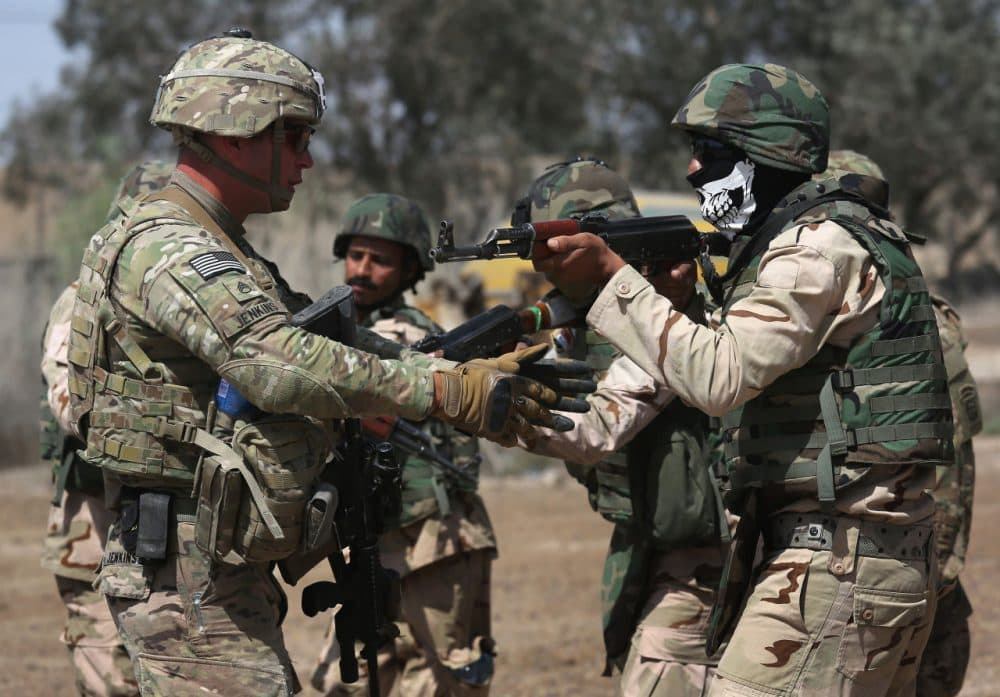Advertisement
The Iraq War And The Rise Of ISIS
Resume
This week, Here & Now is airing a series of conversations about Iraq and the rise of ISIS, and whether the U.S. should be more or less involved in that fight.
Today, host Jeremy Hobson speaks with Ahmed Ali, an Iraqi-American who believes it's a fight the Iraqis have to win for themselves, with some help from the U.S. Ali said he's watching his country struggle in the fight against ISIS.
"Iraqis know they can depend on themselves," he said, "but they need a lot of outside assistance."
Interview Highlights: Ahmed Ali
On whether or not ISIS is winning in Iraq
"I do believe that ISIS remains on the defense in Iraq. By and large the organization has peaked, it has not been able to control any more terrain, and there is a great deal of pressure on ISIS from multiple directions, particularly in northern Iraq, where the Iraq Kurdish peshmerga are continuously containing ISIS and ensuring that ISIS is unable to launch major operations in that area."
"This is not a war that is going to end in a year or two. I at least give it between three to five years, and three to five years of sustained U.S. commitment to support forces on the ground."
"And of course, in the aftermath of the fall of Ramadi, ISIS did gain the momentum, very momentarily, however. That does not mean that we should take solace in that or stop the pressure on ISIS. It just means that we have to understand the nature of the battlefield at the moment as I see it throughout my trips and throughout my research."
When will the war end?
"I think it's very important to put the war against ISIS in perspective. This is not a war that is going to end in a year or two. I at least give it between three to five years, and three to five years of sustained U.S. commitment to support forces on the ground, and to make sure that the U.S. does have a robust air campaign against ISIS. And of course, we know that ISIS is not just operating in Iraq, it's also operating in Syria, which makes the fight against the organization much more difficult. And as a result, we do have to understand the nature of this war. This war cannot polarize the American public as the 2003 war did. This war has to unify the American public, because ISIS is a threat to the United States and the interests of the United States worldwide."
On ISIS' impact and the United States' response
"I don't think the threat of ISIS for the West is up for debate. I do believe ISIS has priorities, and the priority at the moment is to control terrain in Iraq and Syria, and once it has those safe havens, it will shift its attention to the West and it will try to attack the West. And that's why I believe that it is very important for the U.S. to have a sustained commitment in Iraq. That doesn't mean sending deploying 5,000 or 10,000 or 15,000 U.S. troops as some people are calling for, because there are Iraqi forces on the ground fighting ISIS. And by the numbers there are almost 200,000 anti-ISIS forces members in Iraq, and they can play a role. What they need is further U.S. support, and we can provide the air support to those forces. But I do agree with you that this is the fight for the Iraqis to win. U.S. forces and U.S. soldiers should not put their lives on the line to give Iraq another chance."
Defining the United States' role in Iraq
"The U.S. and Iraq are partners, and the U.S. has profound interest in continuing to support Iraq, and continuing to support peace in Iraq. And it doesn't only have to do with the military front. Iraq needs humanitarian assistance, for example, and we, the Education for Peace in Iraq Center, are focused on that effort, because we know that there is going to be a post-ISIS time period, and during that time period a great deal of stabilization will have to take place, and the U.S. government can be effective in promoting peace and security in Iraq. Iraqis are looking to the United States for a leadership role now and moving forward."
Guest
- Ahmed Ali, senior visiting fellow at the Education for Peace in Iraq Center. He tweets @iraqshamel.
This segment aired on July 9, 2015.